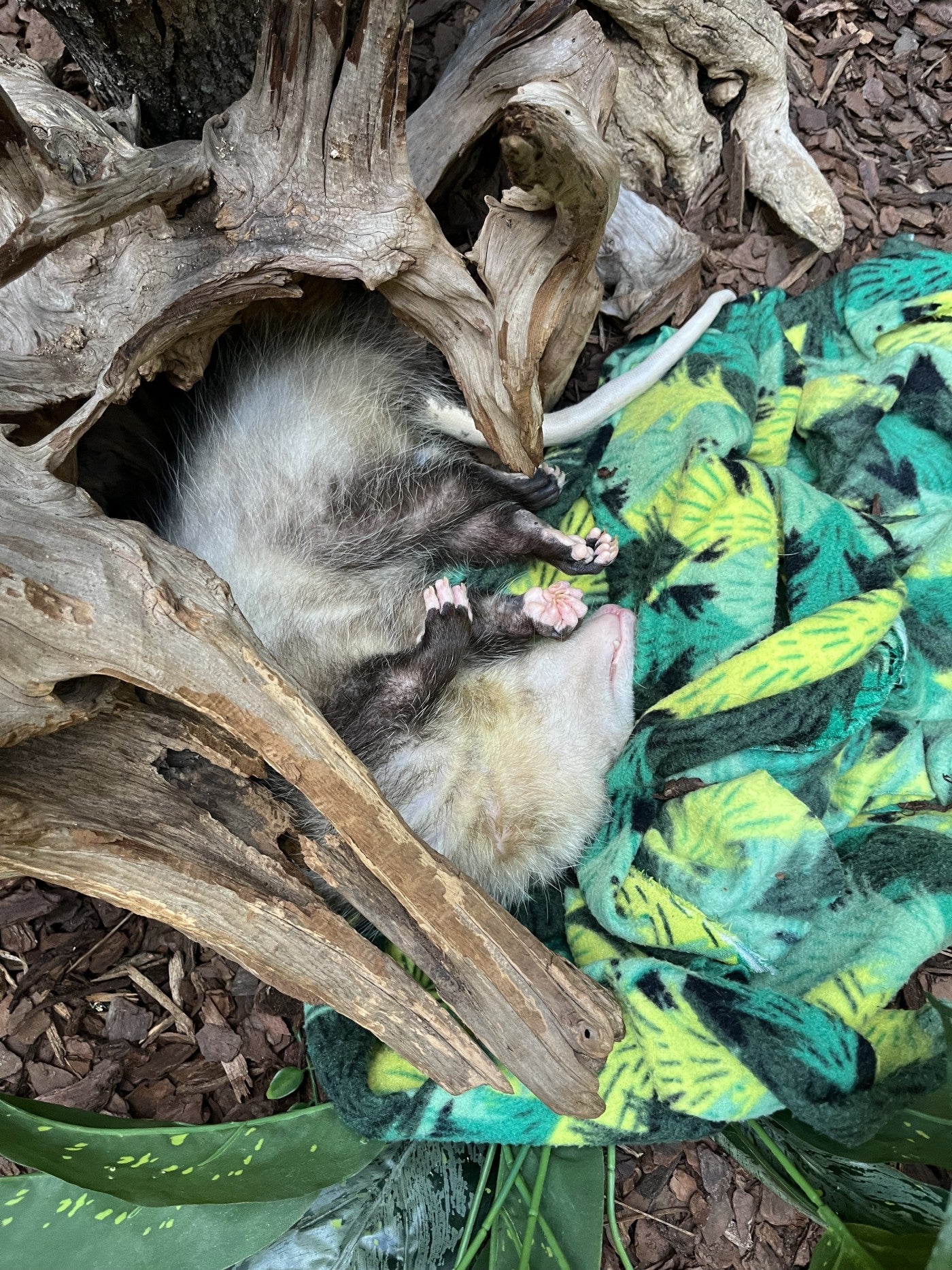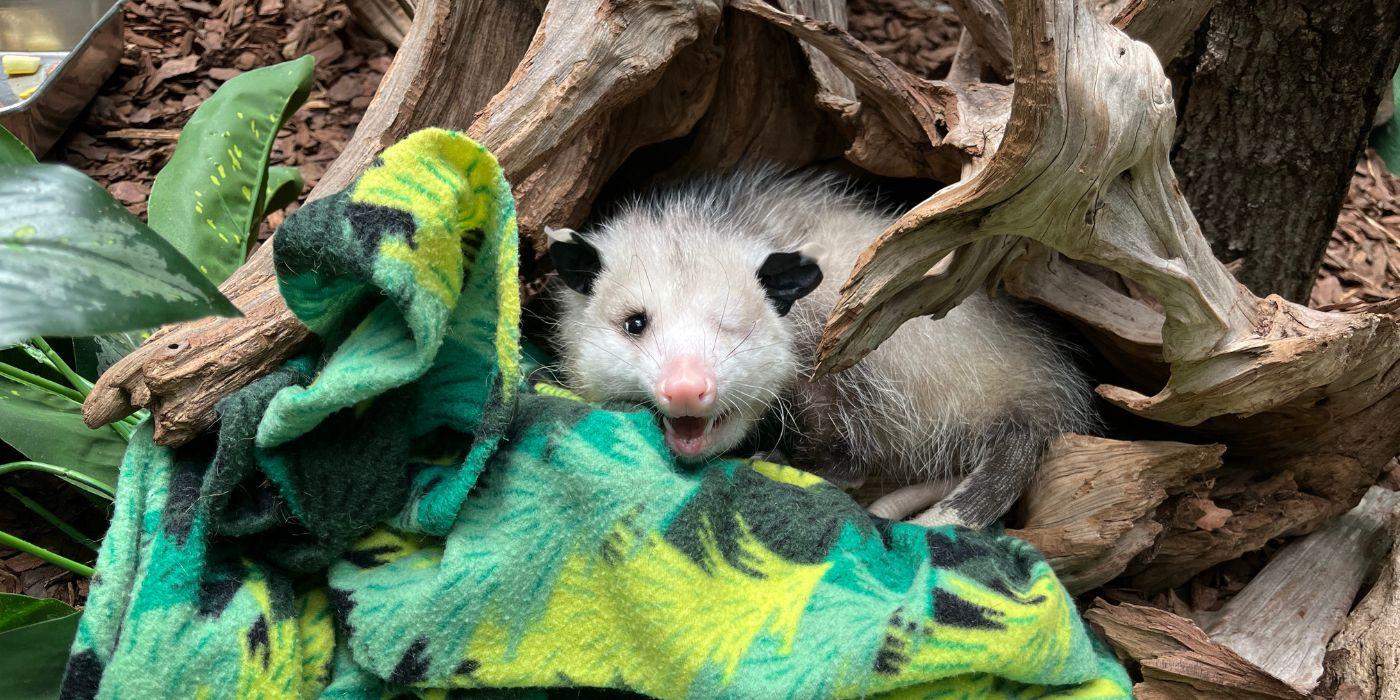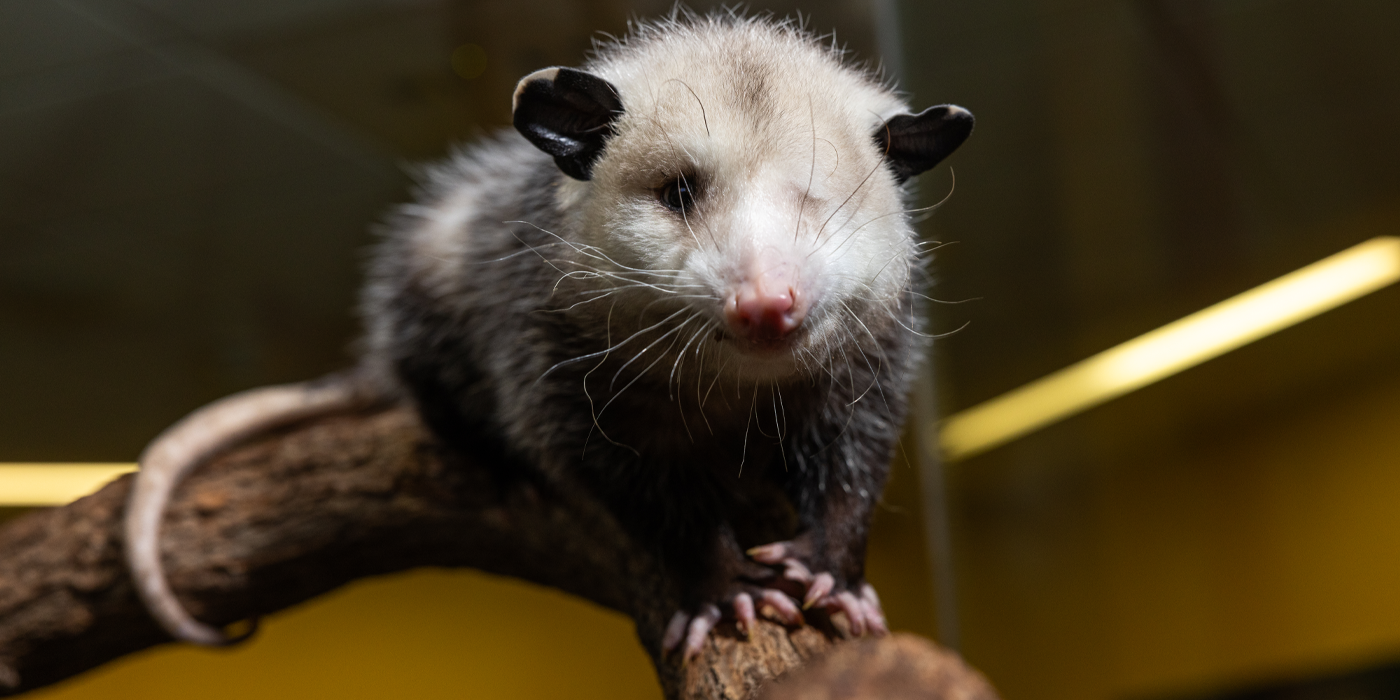New at the Zoo: Basil the Virginia Opossum
Earlier this summer, the Zoo welcomed Basil, a Virginia opossum (also known as a North American opossum) to the Small Mammal House. Get to know Basil and learn more about one of North America's most unique animals in this New at the Zoo!
What are opossums? Are they rodents?
Virginia opossums are not rodents, they are actually North America’s only marsupial! Like other marsupials (such as wallabies and kangaroos), female opossums carry their young in a pouch. A female opossum can have up to 25 offspring in one litter! The young are altricial (meaning helpless at birth) and are about the size of a honeybee. They climb directly into their mother’s pouch after birth to nurse. Once they get too big for the pouch, they will climb onto mom’s back and ride there until they are fully grown.
When young opossums are frightened, they may enter a catatonic state, commonly known as “playing ‘possum.” Though most body functions will remain normal, the juvenile opossum will feign death by becoming motionless, laying down and drooling, and may stay this way minutes or hours! Adults react to threats by baring their teeth, hissing, screeching and standing their ground or by fleeing. Despite this, they are rarely a threat to people.
Who is Basil and how did he come to live at the Zoo?
Our opossum “Basil” came to us from the local wildlife rehabilitation center City Wildlife as a non-releasable animal. He was found injured from a predator attack and brought to City Wildlife, where their team treated his wounds and helped him heal. Young opossums are at large risk for predation by birds of prey, larger mammals and snakes. Pets like dogs are also a threat to opossums when not kept on a leash. Because he lost one of his eyes in the attack, City Wildlife recommended he come to the Zoo’s Small Mammal House as an ambassador for his species. It was unlikely Basil would survive long in the wild with limited eyesight. We’re excited to provide him with a new lease on life and give guests an opportunity to learn about his species!
How is Basil adjusting to the Zoo?
Basil is adjusting very well to his new home. He willingly interacts with keepers and seems to be exploring his exhibit overnight. He does spend most of his days sleeping because opossums are nocturnal. When we interact with him, we’ve learned that he is curious, mellow and very much enjoys being cozy! Basil especially loves his fleece blankets and finding a spot in his logs to get curled up – if you don’t see him right away, that’s the first place to look!

What are Basil’s favorite foods?
Basil loves capelin fish, mice, canned wet food and bananas. Although he does a great job eating almost all the foods he is offered, we’ve noticed he is not a big fan of mushrooms or green peppers.
What do wild opossums eat? Is it different from what Basil eats at the Zoo?
At the Zoo, our nutrition team created a balanced diet of a variety of produce, prey items and insects, as well as canned wet food and pellets that have all the nutrients to help keep Basil healthy! Keepers will supplement with additional and novelty food items through enrichment activities.
Virginia opossums are a scavenger species – meaning they will eat just about anything! In the wild, they will eat primarily insects, small rodents and even snakes, but will consume vegetation as well. Opossums also eat a lot of ticks in the wild because the ticks will attach to the opossum’s body and the opossum will consume the ticks when grooming themselves. In this way, opossums help to control tick populations, which is great for humans and our pets, too!
What has been your favorite moment working with Basil so far?
We try to acclimate most of our animals to attention from keepers, so we are able to monitor their health and maintain a stress-free environment when we are present. We have been working with Basil to approach us for tong feeding and participate in touch training. He is rewarded for participating with his favorite treats and there’s something very endearing about opossums smacking on their treats that we all love! This training helps Basil to not stress when we perform health checks. This will be helpful in getting monthly weight checks on him, too.
What are some of the enrichment items Basil receives? What does he do with them, and what natural behaviors do they encourage?
Enrichment is new for Basil, so he is hesitant to interact with items and is still learning. So far, he enjoys foraging bins the most! We make forage bins with a variety of materials including ball pits or shredded paper in a range of sized bins. The foraging bins recreate the foraging behaviors opossums would utilize in the wild. He uses his sense of smell and his feet to dig and search for the food inside the bins. We will also hang the bins in the exhibit when he is settled in more, so he is encouraged to climb and forage up higher as well!
What do you hope visitors take away from meeting Basil?
Since Basil is non-releasable, we hope he will be able to teach visitors about his species and have a comfortable rest of his life. It’s exciting to have a species that people may see in their own backyard. It’s crucial for our visitors to understand why it’s so important to protect our local wildlife just as much as the wildlife around the planet.
Unlike some of the animals at the Zoo, Virginia opossums are considered to be "of least concern” from a conservation standpoint. However, historically, all species were of least concern at one point. If we took the necessary steps to protect our endangered species before they became endangered, we could have made a big difference in those species’ current wild population status. It is still important for us to be aware of species that are currently not threatened, so that we can protect existing wild populations.
I want to help opossums! What steps can I take to protect them?
Know that if you see an opossum in the wild, it is not a threat to you if you keep your distance and are respectful of its space. Their first instinct is to either play dead or flee when they are scared! Keep your pets on a leash when out in nature to make sure your animal does not come across an opossum. If you see one in your yard, just let it be and it will move on after a while – it may just be doing its job taking care of pests in your garden for you!
Want to meet Basil? Stop by the Small Mammal House on your next visit to the Zoo!
Related Species:

